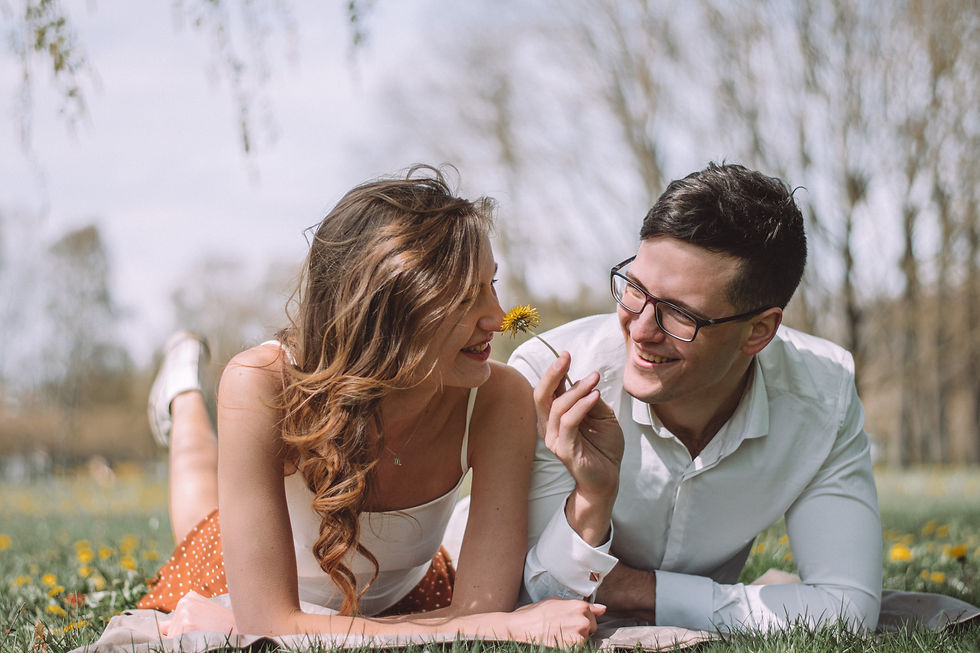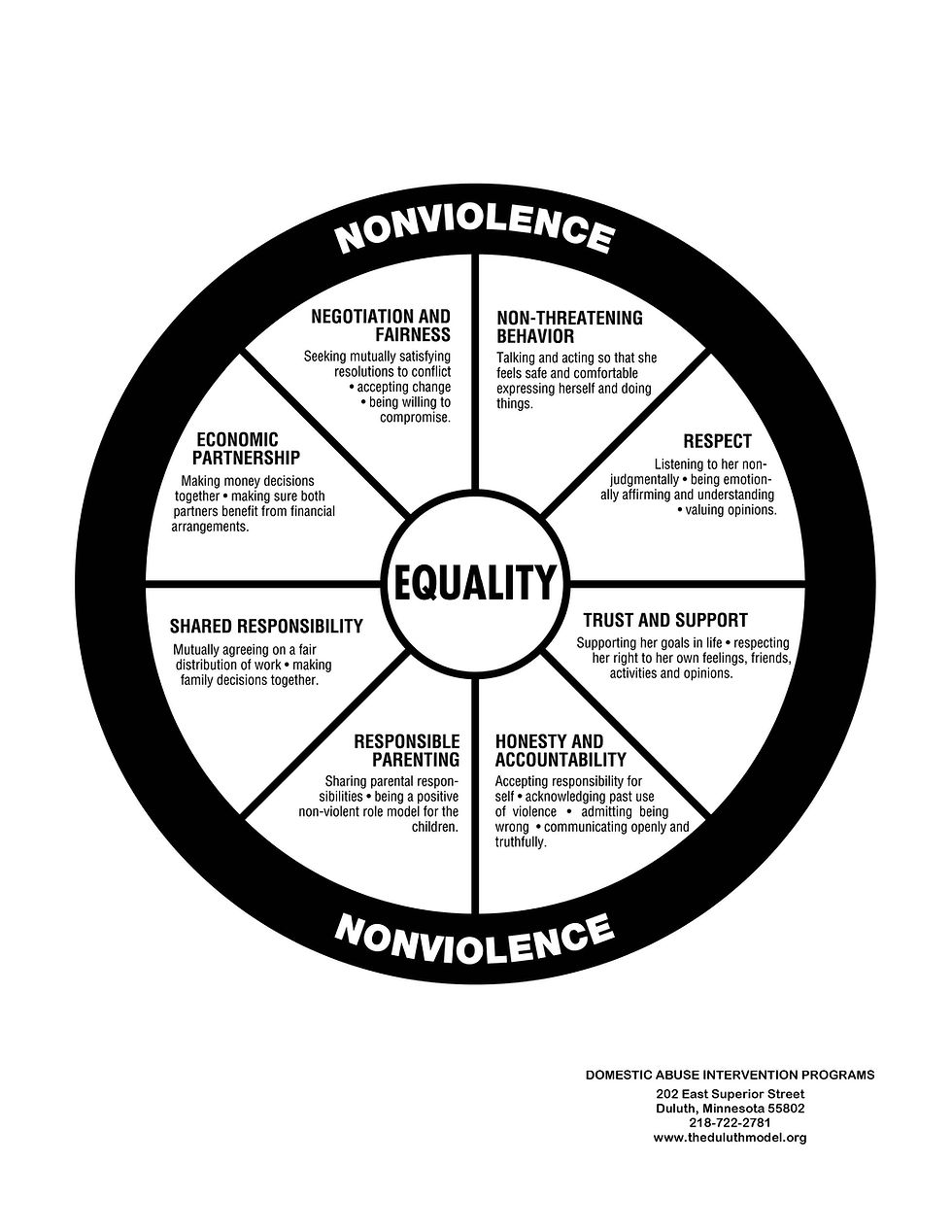Is My Relationship Abusive? 4 Steps to Leaving an Abusive Relationship
- May 8, 2020
- 6 min read
By: Logan Cohen, Licensed Couples Counselor & Family Therapist, New Leaf Counseling Group - Charlotte, NC
Is My Relationship ABUSIVE? Maybe My Relationship is Just Unhealthy? What is "Normal" anyway...?
If you are wondering whether you are in an abusive relationship, then you know it can be hard to "dial in." The descriptions can seem like SUCH a generalization.
Every abuser is different, and every abusive relationship is different. But there is certainly a lot of overlap in behaviors, and if what I’ve said so far sounds at least partially familiar, then, yes, you could be in an abusive relationship.
To be fair, I usually distinguish between what I call “capital A – Abusive” and “little a – abusive” relationships. There are relationships that are toxic, unhealthy, or unequal that have aspects of abusive relationships - but fall closer on the scale of unhealthy.
Some criteria may be met, but the red flags of power and control are several magnitudes of degree lesser. Follow this link to look at the spectrum of characteristics of healthy/unhealthy/abusive relationships:
If you’re still wondering whether your relationship is abusive, let me 4 characteristics of a positive, loving, and healthy relationship.
4 Signs You are NOT in an Abusive Relationship
1st Sign You are NOT in an Abusive Relationship - TRUST
First, a healthy relationship should involve trust; you and your partner should be able to trust and value one another and feel safe disclosing information and being vulnerable.
2nd Sign You are NOT in an Abusive Relationship - You Have Space to be "YOU"
Second, each person in the relationship should still be seen as an individual; while sometimes our culture romanticizes the idea of “two becoming one” in a relationship, no healthy relationship can exist without each person maintaining a sense of self independent from the relationship. What you fell in love with was that person for who they are, in and of themselves, and a healthy relationship doesn’t attempt to compromise or fully merge and take over the other person.
3rd Sign You are NOT in an Abusive Relationship - FAIR Conflict Resolution
Third, disagreements are fair; when you disagree with one another, the disagreements are not power-struggles or insulting. Your partner doesn’t refuse to listen or change the subject and name call.
4th Sign You are NOT in an Abusive Relationship - EQUAL Level of Influence
Finally, neither partner should feel “less than,” and the power dynamic should be roughly equal, with no one having the upper hand or trying to control the other person.
Both partners share in an environment of mutual respect and each tries their best to understand and empathize with the other, communicating openly about their feelings and desires.
To illustrate the dynamics of a healthy relationships, here’s a model intended to show the behavior that I would expect to see as a couples counselor and relationship therapist:
Psychological abuse in relationships is just as hard to escape as any other kind of abusive relationship. The clients we serve in Charlotte, NC often state they wish there were some physical abuse so they could justify leaving.
These same clients report that, regardless of the type of abusive relationship they survived, the psychological destruction and corrosive messages of their abuse were the hardest part of their abuse from which to find recovery.
One client told said, “Bruises fade. The things he said to me, the fact that he took away my ability to trust myself, the lies I now believe about being worthless….I can’t get those out of my head.”
I Think I’m Ready to Leave. What Do I Do? - 4 Steps to Leaving an Abusive Relationship:
The first "step" in leaving an abusive relationship is recognizing it is abusive. This is often the hardest part.
Because these relationships tend to change gradually over time and cycle through good times and bad, it’s very difficult to make your mind up and stick to a decision to leave.
The other complication that many victims face is that an abuser has frequently cut them off from friends and family, has prevented them from access to finances or other resources, or they have to worry about children or even pets. This means it is not only difficult emotionally and psychologically but also practically when the decision is made to leave, which is why many women have to try multiple times.
Additionally, many Victims fear that leaving will provoke their abusive partner into anger, which they have been conditioned to avoid at all costs. This is an entirely reasonable fear.
Leaving an abusive relationship is a time of high risk, and for this reason it’s important to have a series of safety plans in place depending on your situation, even before you leave physically. Here’s a link to help get you started on what a safety plan is and which has several different scenarios to apply to specific circumstances.
If you have tried to leave and have not succeeded, you’re not a failure. On average, a Survivor tries to leave seven times before they are able. But you’re also not a statistic.
#1 Step to Leaving an Abusive Relationship: Create Emotional Distance
First you have to detach emotionally from your abuser, to stop being emotionally invested in the relationship. Basically, you get tired of the rollercoaster and step off.
#2 Step to Leaving an Abusive Relationship: Internal Preparation
Then you notice how the abuse has affected you, how you’re no longer the person you used to be or who you want to be, and notice how your partner is not the person you thought he or she was and start preparing to leave internally.
#3 Step to Leaving an Abusive Relationship: Going Back
Third (and this is a hard step), you return to the relationship and re-invest - going back and forth about whether it’s worth it. This is the point of maximum confusion, and often where people seek therapy.
#4 Step to Leaving an Abusive Relationship: Leaving For Good
Finally, you leave, and if those who are able to stay away for roughly six months are usually able to stick to their decision.
This model is not a perfect description of any individual relationship, so you may recognize only a part of your personal experience. See what fits and what doesn’t; in this case a written article isn’t a match for finding a therapist who can work with you, process your emotions, provide support, and help problem-solve.
If you are in Charlotte, but not yet ready for a therapist or counselor, make sure you use the supports you have in your life outside your relationship and do your best to remain non-judgmental of yourself for being where you are. Everything has its own time, and the fact that you’re looking into abusive relationships at all means you’re on your way.
Do People Recover?
Absolutely YES!
You can not only leave an abusive relationship but heal from it and go on to be healthier, happier, and to have stable and loving intimate relationships. It’s not easy, and you will always have memories and healed scars from your experiences, but each counselor and therapist at New Leaf Counseling Group in Charlotte, NC have seen clients emerge from abusive relationships and watched as the weight started to lift from their shoulders.
It’s a joy as a professional therapist or counselor to see clients begin to enjoy life and find new energy and purpose after coming through so much unhappiness and suffering.
It takes enormous bravery to leave an abusive relationship and step into an unknown future, and no matter where you are on your path, know that psychological abuse is so very very hard to identify, work against in your head and heart, and then decide that you deserve better, that you are better.
Are you wondering, "Is my relationship abusive?" and think you are experiencing psychological abuse?
Therapy or counseling with a trusted professional is one of the best ways to get the voice of your abuser out of your head and to get another voice, a kinder voice, in.
I’ll say it here: You are NOT crazy.
You have the right to say "NO".
Trust your instincts.
You deserve love.
You are enough.
If you feel you might be in an abusive relationship that involves psychological abuse, or if you need help in any of these areas to set healthy boundaries with tactics of power and control, please contact our diverse counselor and therapist team at New Leaf Counseling Group in Charlotte, NC. You can reach us at 704-774-3078 to schedule a free initial consultation - or click here to book an appointment online.
We have a down to earth counselor and therapist team of with room for you to GROW.

















Many people going through spouse physical violence therapy need emotional support to heal. Small gestures of kindness, like sending thoughtful words, can make a huge difference. A heartfelt appreciation note or a simple thank you message for birthday wishes can remind someone that they are valued and loved. In recovery, these messages act as gentle reminders that positive communication rebuilds trust and helps create healthier relationships full of care and respect.
FAST AND EFFICIENT PHONE HACKERS- CHOICEST CODE WEB (CCW)
I needed to reach out to an ethical hacker who his service has brought about solution to successfully remotely track my spouse cell PHONE without stress and with no physical access and this works very fine,i would not hesitate to spread the good services of choicestcodeweb@protonmail.com who's services has helped me already and all my spouse does on his phone pops up and saves on my own phone without stress and with no physical access which works for me very fine
My ex is a heartless narcissistic pathological liar & keeps me from seeing my kids & even has turned my oldest child against me with ridiculous lies! wants to fight over my assets. The pain & the feeling of helplessness consumed me & I didn’t even know what I was doing at that point. But all thanks to the service of this software genius hacker who exposed all her lies and deceits, by hacking her phone and gaining me remote access to her phone activities, I was able to gather enough evidence to present in court for my divorce proceedings, and thankfully I was vindicated. Lies and deceit can only go on for a lil time, but the truth always…
BE CAREFUL!!
Nobody here can help you or even suggest how you can get your ex or love back,any testimonies of most spell casters here must be ignored, because most of them are scam i mean real scam which i was a victim of and i got ripped of thousands of dollars because i was so anxious to get my husband back after he left me for over a year with my little daughter, i have applied to 7 different spell casters here and all to no avail they all ask for same thing like, SEND YOUR NAME, YOUR EX-LOVER NAME, ADDRESS, PICTURE and PHONE NUMBER, Which i did over and over again and most of them were from west…